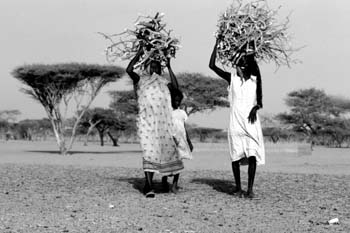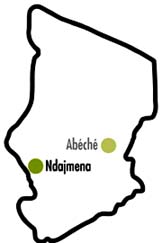
KEY FACTS
Population: 9.8 million
GDP per capita: US$ 260
Population below poverty line: 64%
Labour force by occupation: agriculture more than 80% (subsistence farming, herding and fishing)
Total land area: 1.284 million sq km, bordering Cameroon, Central African Republic, Libya, Niger, Nigeria, and Sudan.
Total arable land: 3%
Life expectancy: male: 45 years; female: 49 years
Literacy rate: male: 56%; female: 39%
Human Development Index: 173/177
(Source: UN; World Bank; CIA Factbook)

FAO IN CHAD
In Chad, FAO continues to provide technical assistance to UNHCR initiatives for refuges and host communities, as well as assistance to WFP in better food aid targeting.
Background
Almost 80 percent of Chad’s population survives on agriculture - subsistence farming, fishing and herding livestock. The country is regularly subject to climatic disturbances and natural disasters, such as droughts, floods, and locust invasions, which lead to food shortages. Some 7 out of 10 Chadians suffer from severely reduced life expectancy, as well as markedly low standards of health, education and well being. Adding to this precarious situation is a post-conflict environment, which stems from decades of violence and civil unrest. There is widespread proliferation of small arms, increasing levels of banditry and criminality, armed rebellion, as well as danger from land mines.
The political environment remains tense, creating fears of a return to conflict. State revenues are low due to falling cotton prices, increased expenditure on security caused by a heavy influx of refugees and the unpredictability of export revenues from cattle. Civil servants, the military and other public workers demand payment of salary arrears.
Conflicts in Sudan and the Central African Republic are exacerbating Chad's poverty and food insecurity. Almost 200 000 Sudanese, mainly from Darfur, have taken refuge in the eastern part of the country. Ongoing insecurity in Darfur means refugees are likely to remain in the region for some time. In the south, 12 500 refugees from the Central African Republic have recently joined 30 000 refugees who have been living in southern Chad since 2003. If a peaceful coexistence between host and refugee communities is to be maintained, income-generating activities and food security for both refugees and local communities have to be strengthened.
Needs analysis: Food security and agriculture sectors
Chad is a country blighted by poverty, with key human indicators providing disturbing evidence. Some 64 percent of the population lives below the national income poverty line. Almost 66 percent are without sustainable access to safe water sources. Over 28 percent of the children are underweight for their age. Agricultural activity is complicated by a weakening respect for traditional migration routes, recurrent drought and locusts.
In such a context of general poverty, the arrival of huge refugee communities is placing host populations in a very precarious situation, characaterized by depletion of existing natural resources and the overuse of arable land. Overgrazing is creating tensions between refugees and the host population. Fodder stocks required for refugee livestock have swelled to over two million tons. Furthermore, the arrival of non-immunized livestock is bringing a heightened risk of disease. As livestock represents the primary asset of most of the refugee and host population, protective measures are urgently needed to safeguard herds.
FAO’s assistance aims at promoting food security by boosting household production of food thus supporting self-reliance. Vulnerable refugee and host communities require agricultural inputs and support to small animal breeding. With adequate funding, FAO will also continue to support the government and humanitarian partners in effective coordination of agriculture sector interventions. Preventing disputes between refugees and host population will be a primary consideration in the provision of agricultural assistance, together with rational, communal management of agricultural resources.
PROPOSALS
FAO RELIEF AND REHABILITATION ASSISTANCE
Funding
required: US$ 6 649 230
|
Livestock protection and promotion of small animal breeding |
Issues addressed: Overgrazing creates tensions between refugees and host populations. Animal diseases are also increasing.
Objectives: Improve food security and living conditions of Sudanese refugees and host populations in eastern Chad, through safeguarding their livestock and the promotion of small animal breeding.
Activities: Provision of local goats, sheep and veterinary kits to 10 000 households to improve small ruminant farming and create income generation. Promotion of fodder crops. Distribution of animal feed. Installation of 20 water points/wells. Provision of urgent livestock vaccination and care in the most-affected areas.
Beneficiaries: 100 000 refugees (85 percent women and children) and 100 000 vulnerable members of host populations (50 percent women and children).
Implementing partners: Ministry of Agriculture (ONDR, Regional Delegation), UNHCR, WFP, national and international NGOs (AFRICARE, SECADEV, CARE International, OXFAM).
Duration: January 2006 - December 2006.
Funds requested: US$ 2 451 000.
|
Emergency supply of agricultural inputs for Sudanese refugees and the host population and the inclusion of women and youth in productive agriculture activities |
Issues addressed: Sudanese refugees and host population in eastern Chad suffer severe food insecurity and inadequate nutrition.
Objectives: Improve food security for refugees and vulnerable host population in eastern Chad by increasing productivity and creating income generating activities.
Activities: Procurement of seeds and tools. Provision of mills, well drilling and equipment for pond construction. Training and assistance in creating 110 women and youth groups. Promotion of appropriate agricultural techniques, training to safeguard the environment and soil fertility.
Beneficiaries: 200 000 refugees and 200 000 vulnerable persons among host populations (85 percent women and children).
Implementing partners: Ministry of Agriculture (ONDR), UNHCR, WFP, national and international NGOs (AFRICARE, SECADEV, INTERSOS, CARE International and Première Urgence).
Duration: January 2006 - December 2006.
Funds requested: US$ 3 322 800.
|
Coordination of emergency and rehabilitation agricultural activities |
Issues addressed: Agriculture and livestock constitute the main livelihoods in zones hosting Sudanese refugees, while refugees tend to be farmers and herders themselves. These sectors are faced with a variety of natural impediments exacerbated by the lack of technical, material and financial resources. The precarious situation for the majority of eastern Chad’s inhabitants has been further aggravated by the influx of refugees from Sudan and Central African Republic. The locust threat also requires continued monitoring. An effective coordination structure has to be established in close co-operation with governmental institutions, relevant UN Agencies, NGOs and grassroots associations.
Objectives: Coordination of agriculture sector interventions
Activities: Technical assistance to the Ministries of Agriculture and Livestock. The establishment of emergency management, monitoring and evaluation and rehabilitation projects in the agricultural sector. Reinforcement of national capacities through a local evaluation expert. Information to donors and partners through an easy accessible database. Training in mission monitoring/evaluation and project/programme design in emergency areas.
Beneficiaries: Vulnerable rural households
Implementing partners: Ministries of Agriculture and Livestock, ONDR, Regional Livestock and Environmental Delegations, UN Agencies, national and international NGOs.
Duration: January 2006 - December 2006.
Funds requested: US$ 314 175.
|
Urgent supply of essential agricultural inputs for Central African Republic refugees and host families |
Issues addressed: A prolonged presence of settled refugees is augmented by a recent influx of newcomers, straining food availability. The situation for local communities is become increasingly precarious, in particular for small-scale farmers and female-headed households
Objectives: Improve food security of refugees and vulnerable host populations in southern Chad by increasing productivity and creating income generating activities
Activities: Procurement of food seeds (millet, sorghum and groundnut), cash-crop seeds (tomato, gumbo, sorrel, pepper, eggplant), hoes and other tools.
Beneficiaries: 30 000 refugees, the majority being women and children, as well as 15 000 of the most vulnerable persons among the host populations.
Implementing partners: Ministry of Agriculture (ONDR), UNHCR, WFP, CRT, national and international NGOs (AFRICARE, Africa Concern, APICA BELACD).
Duration: January 2006 - December 2006.
Funds requested: US$ 561 255.